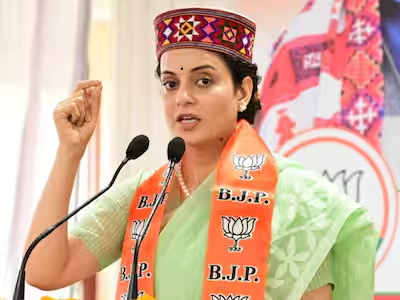Kangana Ranaut, the Bollywood actress known for her outspoken nature, has once again found herself embroiled in controversy, this time for wading into the politically charged waters of the farmers’ protests. While Ranaut, who formally joined the Bharatiya Janata Party (BJP) in 2020, is no stranger to expressing her views, her recent comments comparing the protests to the Bangladesh Liberation War have sparked widespread condemnation, forcing the BJP to distance itself from her remarks and highlighting the delicate tightrope political parties must walk when navigating sensitive national issues.
The controversy erupted when Ranaut, in a series of tweets, suggested that the farmers’ protests could have escalated into a crisis akin to the 1971 Bangladesh Liberation War had the government not taken decisive action. This inflammatory comparison drew immediate backlash from across the political spectrum, with many criticizing her for trivializing the historical significance of the Bangladesh Liberation War and its associated human cost, while simultaneously demonizing the farmers’ movement.
The BJP, already facing criticism for its handling of the farmers’ protests, was quick to distance itself from Ranaut’s remarks. Party leaders, including those from BJP-ruled states like Haryana and Punjab, publicly denounced her statements, emphasizing that they did not reflect the party’s official stance. This swift condemnation underscores the BJP’s concern over the potential damage Ranaut’s comments could inflict on its carefully cultivated image, particularly within the crucial agricultural communities of Haryana and Punjab.
Ranaut’s comments have placed the BJP in a precarious position. On the one hand, the party has consistently sought to project itself as a champion of farmers’ rights, implementing various schemes and initiatives aimed at improving their livelihoods. Prime Minister Narendra Modi himself has repeatedly reiterated the government’s commitment to the welfare of farmers, positioning them as the backbone of the Indian economy.
However, Ranaut’s inflammatory rhetoric, particularly her attempt to paint the farmers’ protests as a potential threat to national security, directly contradicts this carefully constructed narrative. Her comments threaten to alienate the very demographic the BJP has been assiduously courting, potentially jeopardizing its electoral prospects in key agricultural states.
Beyond the immediate political fallout, Ranaut’s comments raise broader concerns about the responsibility that comes with wielding public influence, especially when representing a political party. While individuals are entitled to their opinions, expressing them without due consideration for their potential impact, particularly when those opinions touch upon sensitive historical events or ongoing social movements, can have unintended and damaging consequences.
Ranaut’s remarks, while possibly intended to express support for the government’s stance, have instead served to further polarize an already sensitive issue. Her incendiary language and exaggerated comparisons have only served to deepen the divide between the protesting farmers and the government, making a negotiated solution all the more elusive.
The Congress, the principal opposition party, has seized upon Ranaut’s comments as further evidence of the BJP’s alleged insensitivity towards the concerns of farmers. Congress leaders have questioned whether Ranaut’s remarks reflect a broader sentiment within the BJP, accusing the party of harboring an authoritarian streak that seeks to stifle dissent and brand any form of opposition as anti-national.
While the BJP has sought to distance itself from Ranaut’s remarks, the damage to its image may be difficult to undo. The incident highlights the challenges faced by political parties in managing the public pronouncements of its members, particularly those with a history of making controversial statements. It also underscores the need for greater sensitivity and restraint when discussing complex and emotionally charged issues like the farmers’ protests.
The farmers’ protests, which have been ongoing for over a year, represent a significant challenge to the Modi government. The protests, sparked by the introduction of three contentious farm laws, have galvanized farmers from across India, uniting them in opposition to what they perceive as a threat to their livelihoods and a betrayal of the government’s promise to safeguard their interests.
While the government has since repealed the contentious farm laws, the protests continue, highlighting the deep-seated distrust and anger that exists within the farming community. Ranaut’s inflammatory remarks, rather than contributing to a constructive dialogue, have only served to exacerbate this sense of alienation and mistrust.
In conclusion, Kangana Ranaut’s recent comments on the farmers’ protests represent a significant political misstep, one that has drawn sharp criticism and forced the BJP to publicly distance itself from her remarks. The incident underscores the importance of responsible speech, particularly for individuals affiliated with political parties, and the need for sensitivity and restraint when discussing sensitive national issues. While Ranaut is entitled to her personal opinions, expressing them in a manner that inflames tensions and potentially undermines the efforts of her own party reflects a lack of judgment and political awareness. The BJP, already grappling with the fallout from the farmers’ protests, must now contend with the added challenge of repairing the damage inflicted by Ranaut’s ill-advised remarks, a task that will require a concerted effort to rebuild trust and engage in a more constructive dialogue with the very community it claims to represent.

